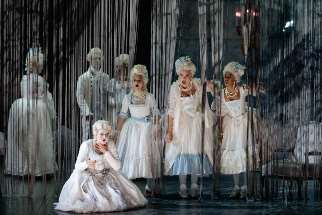|
Back
Ghosts Haunts Glimmerglass Albany
Cooperstown (Alice Busch Theater)
07/13/2019 - & July 23, 25*, August 3, 9, 12, 18, 23, 2019
John Corigliano: The Ghosts of Versailles
Yelena Dyachek (Marie-Antoinette), Jonathan Bryan (Beaumarchais), Peter Morgan (Louis XVI), Zachary Rioux (Marquis, Page), Noragh Devlin (Woman with Hat, Duchess), Ben Schaefer (Figaro), Kayla Siembieda (Susanna), Joanna Latini (Rosina), Brian Wallin (Count Almaviva), Christian Sanders (Bégearss), Emily Misch (Florestine), Spencer Britten (Léon), Katherine Maysek (Cherubino), Gretchen Krupp (Samira), Wm. Clay Thompson (Suleiman Pasha), Tucker Reed Breder (Wilhelm), Charles H. Eaton (English Ambassador), Spencer Hamlin (Swordsman, Revolutionary), Tanyaradzwa A. Tawengwa (Pursuer, Revolutionary), Teresa Perotta, Abigail Paschke, Simran Claire (Gossips), Bryn Holdsworth, Lindsay Metzger, Maxwell Levy, Christopher Carbin (Ghost Quartet), Rachel Kay, Joshua Kring, Jorrell Lawyer-Jefferson, Jasmine Harris (Dancers)
Glimmerglass Festival Orchestra and Chorus, Joseph Colaneri (conductor)
Jay Lesenger (production), James Noone (sets), Nancy Leary (costumes), Robert Wierzel (lights), Eric Sean Fogel (choreography)

Y. Dyachek, A. Paschke, T. Perotta, S. Claire (© Karli Cadel)
John Corigliano’s most important work occupies a unique position in modern American opera: it is successful. While other composers’ works are rarely ever more than a flash in the pan – and often flop altogether – The Ghosts of Versailles has enjoyed numerous productions and revivals since its 1991 premiere as a work commissioned by the Metropolitan Opera. What makes it different? Corigliano, who worked on the opera with librettist William M. Hoffman for eleven years, intended it to be a satire or spoof on operatic traditions. He famously described it as a “grand opera buffa,” an oxymoronic term since no grand opera could ever have a “buffa” quality to it. Two hundred years after the French Revolution, the bored ghosts of Louis XVI and Marie-Antoinette and their court continue to inhabit the grand palace at Versailles. The ghost of the playwright Beaumarchais, who authored the trilogy of plays that gave us the “Figaro” operas of Rossini and Mozart, seeks to win the dead queen’s affection by inventing a new opera around his neglected third play, La Mère coupable, which sets the familiar cast of Spanish characters in Paris – along with a young couple who are products of respective extramarital liaisons – at the height of the French Revolution. Corigliano labored to include traditional arias, duets, trios, quartets, elaborate ensemble scenes, leitmotifs, voguish Orientalism, a wicked villain, a damning judgment scene, comical servants, dramatic plot twists, and even a Wagnerian soprano who, with spear and hat-with-horns, declares at the end of the first act, “This is not opera! Wagner is opera!”
But if the point was to satirize those operatic conventions, The Ghosts of Versailles merely affirmed them. “Sophisticated” composers deny it, but we still live in a fundamentally Romantic age. Memorable and moving music appeals to audiences. Corigliano may not have intended it that way, but “Come now, my darling,” a flashback duet for Cherubino and Rosina that evolves with Mozartean precision into a quartet involving Beaumarchais and Marie-Antoinette, stands as the most ravishing love scene in American opera. The comedic antics have not gone stale. Marie-Antoinette’s finale reconciliation with her fate remains immensely moving. Thirty years on, it is more than fair to say that Ghosts has not only held the stage but may even be considered a classic.
It was certainly helped by Jay Lesenger’s colorful production, which moved easily between the monochrome realm of the ghosts and the flashy but guardedly traditional trappings of the opera within the opera. It lacked some of the spectacular qualities of the Met’s production (last heard there in 1995), but it was picturesque and made for a congenial evening. Later this year it will be presented at the court theater of Versailles itself, an event that should be anticipated with great enthusiasm.
Apart from the lithe Ukrainian soprano Yelena Dyachek, who sang Marie-Antoinette with delicate passion and superb English diction, Glimmerglass’s Young Artist program staffed the cast. Jonathan Bryan’s Beaumarchais and Peter Morgan’s Louis XVI stood out for their gravitas. Christian Sanders was marvelously hissable and nasty as the villain Bégearss. Wm. Clay Thompson did a fine job in the caricatured role of Suleiman Pasha. Joanna Lantini and Katherine Maysek stood out as Rosina and Cherubino. Maestro Joseph Colaneri gave a fine reading of Corigliano’s sophisticated score.
Paul du Quenoy
|